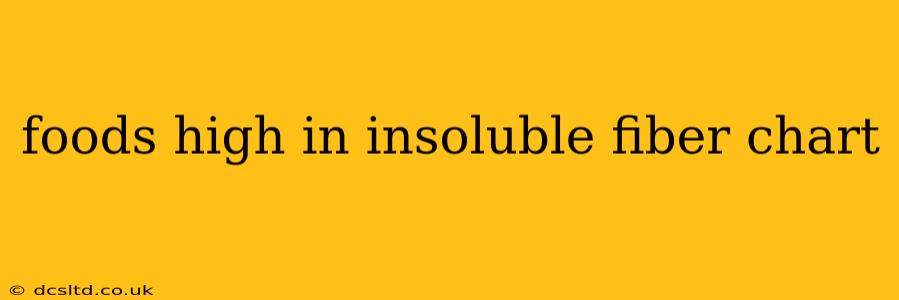Insoluble fiber is a crucial part of a healthy diet, contributing significantly to digestive health and overall well-being. Unlike soluble fiber, which dissolves in water, insoluble fiber adds bulk to the stool, promoting regularity and preventing constipation. This comprehensive guide provides a detailed chart of foods high in insoluble fiber, along with answers to frequently asked questions.
What are the benefits of insoluble fiber?
Insoluble fiber offers a multitude of health benefits, including:
- Improved Digestive Health: It adds bulk to the stool, making it easier to pass and preventing constipation. This can alleviate symptoms like bloating and discomfort.
- Regular Bowel Movements: Consistent consumption promotes regularity, leading to healthier and more frequent bowel movements.
- Reduced Risk of Diverticulitis: The increased bulk in the stool helps prevent the formation of diverticula (small pouches in the intestinal wall), reducing the risk of diverticulitis.
- Lowered Risk of Hemorrhoids: Easier bowel movements reduce strain on the rectum and anus, thereby minimizing the risk of hemorrhoids.
- Blood Sugar Control: While not as directly impactful as soluble fiber, insoluble fiber can still contribute to better blood sugar management by slowing down digestion.
Foods High in Insoluble Fiber: A Detailed Chart
This chart lists foods high in insoluble fiber, categorized for easy reference. Fiber content varies depending on factors like preparation and ripeness. The values provided are approximate averages.
| Food Group | Food Item | Approximate Fiber (grams per serving) | Serving Size Example |
|---|---|---|---|
| Whole Grains | Whole Wheat Bran | 14-20+ | 1/4 cup |
| Whole Wheat Bread | 2-4 | 1 slice | |
| Brown Rice | 1-2 | 1/2 cup cooked | |
| Oats (especially Steel-Cut) | 2-4 | 1/2 cup cooked | |
| Popcorn (air-popped) | 2-4 | 3 cups popped | |
| Vegetables | Broccoli | 2-3 | 1 cup cooked |
| Cauliflower | 2-3 | 1 cup cooked | |
| Green Beans | 1-2 | 1 cup cooked | |
| Brussels Sprouts | 2-4 | 1 cup cooked | |
| Carrots (with peel) | 2-3 | 1 cup chopped | |
| Celery | 1-2 | 2 stalks | |
| Fruits | Pears (with skin) | 2-3 | 1 medium |
| Apples (with skin) | 2-4 | 1 medium | |
| Berries (strawberries, raspberries, blueberries) | 1-3 | 1 cup | |
| Avocado | 6-10 | 1/2 avocado | |
| Legumes | Lentils | 7-10 | 1/2 cup cooked |
| Kidney Beans | 5-7 | 1/2 cup cooked | |
| Black Beans | 5-7 | 1/2 cup cooked | |
| Nuts & Seeds | Almonds | 3-4 | 1/4 cup |
| Chia Seeds | 10-12+ | 1 tablespoon | |
| Flax Seeds | 2-3 | 1 tablespoon |
Note: These are approximate values. Always check nutrition labels for the most accurate information.
How much insoluble fiber should I eat per day?
The recommended daily intake of fiber varies depending on age and other factors. However, a general guideline is to aim for 25-30 grams of total fiber per day. A balanced diet that includes a variety of the foods listed above will help you reach this goal. It's crucial to gradually increase your fiber intake to avoid digestive discomfort.
What happens if I eat too much insoluble fiber?
Consuming excessive amounts of insoluble fiber can lead to gas, bloating, and abdominal cramping. It's important to increase your fiber intake gradually to allow your digestive system to adjust. Drinking plenty of water is essential when increasing fiber consumption.
What are some good sources of both soluble and insoluble fiber?
Many foods contain both soluble and insoluble fiber. Good examples include whole grains (like oats and barley), legumes (beans and lentils), and fruits and vegetables (especially those with the skin on). A diverse diet ensures you receive a balanced intake of both types of fiber.
Can insoluble fiber help with weight loss?
Insoluble fiber aids in weight management by promoting satiety (feeling full), which can help reduce overall calorie intake. Additionally, its impact on digestive health contributes to better overall well-being.
This comprehensive guide provides valuable information on foods rich in insoluble fiber and its various health benefits. Remember to consult a healthcare professional or registered dietitian for personalized dietary advice.
